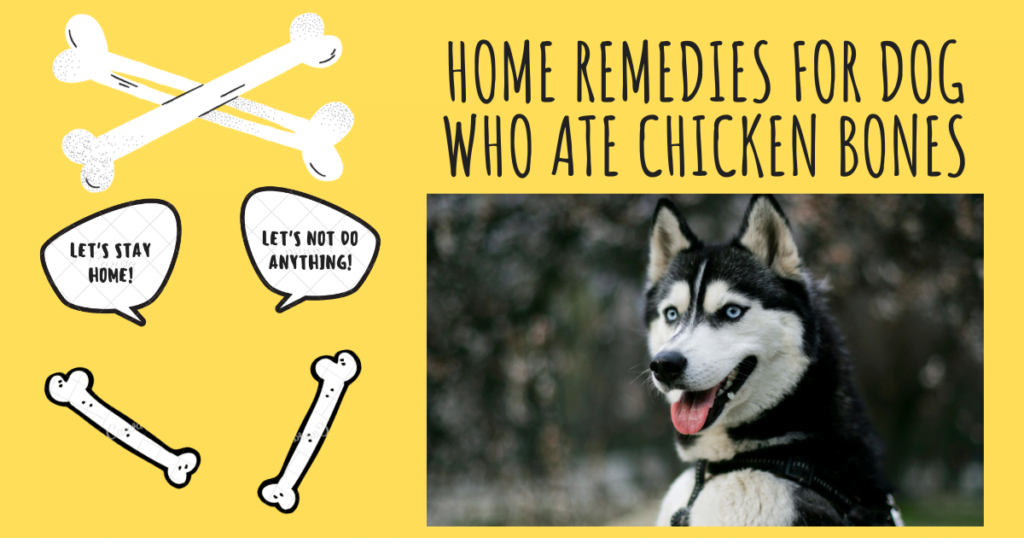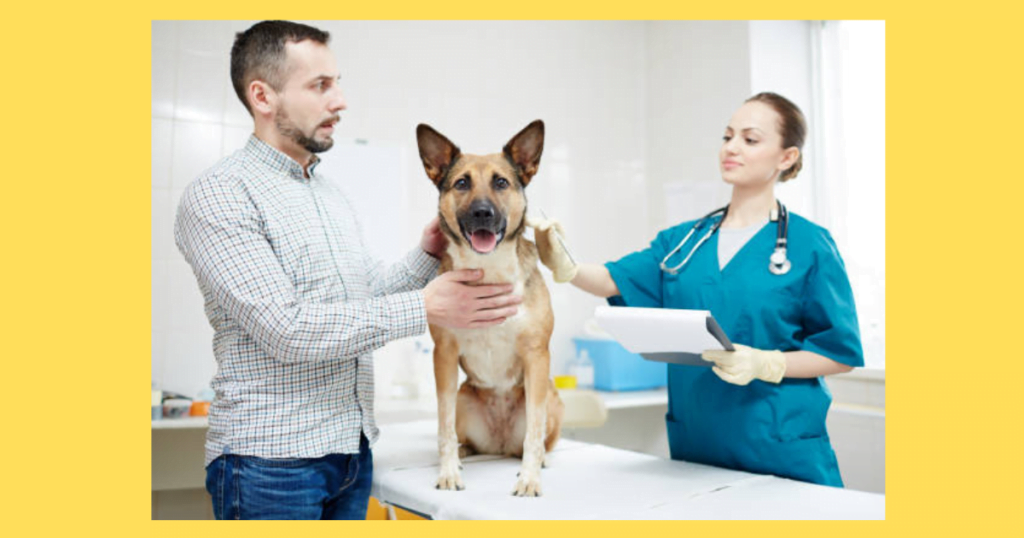Are you looking for Home Remedies For Dog Who Ate Chicken Bones while swallowing its meat portion? Your search never goes in vain. Here is the solution.
Table of Contents
Home Remedies For Dog Who Ate Chicken Bones
If your dog has ingested chicken bones, it is important to take immediate action to avoid any potential harm. While home remedies are not recommended in such cases, here are a few steps you can take:
- Stay calm: Panicking can make the situation worse. Stay composed and focused on helping your dog.
- Remove immediate access to food: Limit your dog’s access to any more food to prevent further ingestion.
- Do not induce vomiting: It is not recommended to induce vomiting without consulting a veterinarian, as bones can cause damage on the way back up.
- Monitor your dog: Watch for any signs of distress or discomfort, such as choking, coughing, vomiting, or difficulty breathing.
- Contact a veterinarian: It is crucial to seek professional advice. Contact your veterinarian immediately for guidance based on your dog’s specific situation.
- Follow veterinarian’s instructions: Your vet may recommend monitoring your dog at home or bringing them in for an examination, depending on the severity of the situation.

It is difficult to determine exactly how long a dog will be sick after eating chicken bones as it can vary depending on various factors such as the size of the dog, the size and amount of chicken bones consumed, and the dog’s overall health. However, it is important to note that home remedies for dog who ate chicken bones can be hazardous for dogs as they can splinter and cause choking, internal injury, or blockages.
This is in reference to my earlier blog post on achieving optimal health for all living creatures as well.
What should you do if your dog ate chicken bones?
If your dog ate a chicken bone, follow these steps:
If your dog eats a chicken bone but seems fine, it is still important to monitor them closely for any signs of distress or discomfort. While some dogs may be able to pass the bone without any issues, there is a risk of the bone splintering and causing damage to the digestive tract.
Please note that this advice is not a substitute for professional veterinary guidance. It’s always best to consult with a veterinarian for personalized advice based on your dog’s health and circumstances, so far as home remedies for dog who ate chicken bones are concerned.

What Happens To Your Dog Who Ate Chicken Bones ?
It typically takes around 24 to 48 hours for chicken bones to pass through a dog’s digestive system. However, it’s important to note that chicken bones can be dangerous for dogs as they can splinter and cause internal injuries.
Feeding your dog a small amount of canned pumpkin puree (not pumpkin pie filling) can help lubricate the digestive system and potentially aid in passing the chicken bone. However, it is important to consult with a veterinarian for proper guidance and to rule out any potential risks or complications against the later consequences of home remedies for dog who ate chicken bones.
Do You Need To Provide home remedies for a dog who ate chicken bones By Mistake ?
If your dog has eaten a chicken bone but appears fine, it is still important to monitor them closely. While dogs can sometimes pass small chicken bones without any issues, there is still a risk of complications such as choking, gastrointestinal blockages, or internal injuries.
Chicken bones are essential to ensure the safety and well-being of your furry friend. While it is always recommended to seek immediate veterinary attention, there are a few home remedies that may help alleviate the situation. However, it is crucial to remember that these home remedies for dog who ate chicken bones should only be used as a temporary solution until professional help can be obtained. Here are a few home remedies for a dog who ate chicken bones:
Feed Your Dog Bread: Giving your dog a small amount of bread can help cushion the sharp edges of the chicken bones and aid in their passage through the digestive system.
Monitor Your Dog: Keep a close eye on your dog for any signs of discomfort, such as excessive drooling, vomiting, or difficulty in passing stool. If these symptoms worsen or persist, seek immediate veterinary attention.
Hydration is Key: Ensure that your dog has access to plenty of fresh water, as it can help soften the bones and facilitate their movement through the digestive tract.
Fiber-Rich Diet: Consider adding fiber-rich foods to your dog’s diet, such as pumpkin or sweet potatoes. These can help promote healthy digestion and assist in the passage of any foreign objects.
No Feeding or Exercise: Avoid feeding your dog any further meals until the situation is resolved, as it can lead to further complications. Additionally, refrain from excessive exercise to minimize the risk of the bones causing further harm
- Sound Sleep: Allowing your dog to have a sound sleep without any disturbance will also ease the situation to certain extent. A detailed description on having a quality sleep pattern in all living creatures is available in my another blog post.
Remember, these home remedies should never replace professional veterinary care. If your dog has ingested chicken bones, it is crucial to consult with a veterinarian immediately to ensure the best course of action for your pet’s health and well-being.
Do Home Remedies For A Dog Who Ate Chicken Bones Fail If Your Dog Does Not Need Them?
The answer to this question is not always straightforward.
If your dog has eaten something they shouldn’t have, it’s important to take immediate action. Here are some remedies you can try:
Contact your veterinarian: Call your vet to seek professional advice on what to do next based on the specific item your dog ingested.
Induce vomiting: If advised by your vet, you can try to induce vomiting in your dog by giving them hydrogen peroxide. The recommended dosage is 1 teaspoon per 10 pounds of body weight, up to a maximum of 3 tablespoons. However, always consult your vet before inducing vomiting.
Offer activated charcoal: Activated charcoal can help absorb toxins and prevent their absorption in the body. Check with your vet for the appropriate dosage and administration method.
Monitor your dog: Keep a close eye on your dog for any unusual symptoms or changes in behavior. If you notice anything concerning, contact your vet immediately.
Remember, these remedies are general suggestions, and it is crucial to consult your veterinarian for specific guidance based on your dog’s situation. More information on optimal health for all living creatures can be had from my another blog post.
Frequently Asked Questions (FAQ)
Feeding your dog a small amount of canned pumpkin puree (not pumpkin pie filling) can help lubricate the digestive system and potentially aid in passing the chicken bone. However, it is important to consult with a veterinarian for proper guidance and to rule out any potential risks or complications so as to make him understand him that home remedies for dog who ate chicken bones did not work.
It typically takes around 24 to 48 hours for chicken bones to pass through a dog’s digestive system. However, it’s important to note that home remedies for dog who ate chicken bones can be dangerous for dogs as they can splinter and cause internal injuries. It is recommended to avoid giving chicken bones to dogs altogether.
If your dog has eaten a chicken bone but appears fine, it is still important to monitor them closely. While dogs can sometimes pass small chicken bones without any issues, there is still a risk of complications such as choking, gastrointestinal blockages, or internal injuries. It is recommended to contact your veterinarian for advice specific to your dog’s situation.
It typically takes around 24 to 48 hours for chicken bones to pass through a dog’s digestive system. It is important to seek veterinary assistance if your dog has ingested chicken bones as they can cause potential health risks such as choking, gastrointestinal obstruction, or injury to the digestive tract.
Final Thoughts
Feeding your dog a small amount of canned pumpkin puree (not pumpkin pie filling) can help lubricate the digestive system and potentially aid in passing the chicken bone. However, it is important to consult with a veterinarian for proper guidance and to rule out any potential risks or complications.
It typically takes around 24 to 48 hours for chicken bones to pass through a dog’s digestive system. However, it’s important to note that chicken bones can be dangerous for dogs as they can splinter and cause internal injuries. It is recommended to avoid giving chicken bones to dogs altogether.
